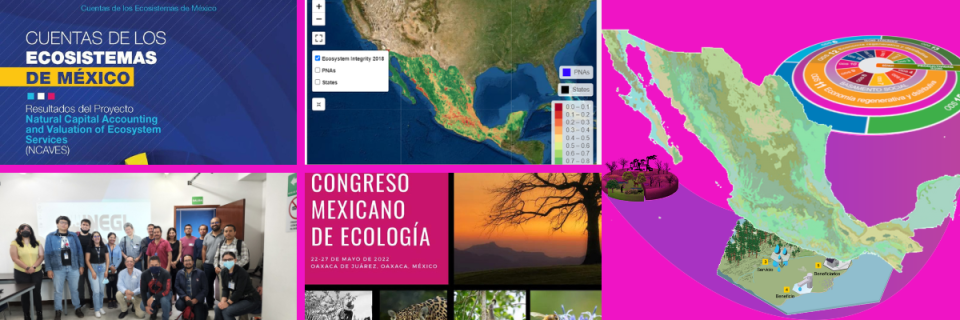New Progress in Mexico on the SEEA after the NCAVES Project

After the successful completion of the project Natural Capital Accounting and Valuation of Ecosystem Services (NCAVES) in Mexico, which ended in December 2021 with a High Level National Forum on Ecosystem Accounting, the National Institute of Statistics and Geography (INEGI), in coordination with the Ministry of Environment and Natural Resources (SEMARNAT), has promoted several initiatives to identify the potential uses of ecosystem accounts and to establish strategies to overcome the challenges in the implementation of the SEEA Ecosystem Accounting (SEEA EA) in the country.
Led by INEGI, an interinstitutional technical group was established during the NCAVES project with the cross-cutting participation of SEMARNAT and with the collaboration of other relevant government institutions and academia. The group meets regularly to discuss the collaboration and institutionalization mechanisms for the systematization [regular production] and implementation of ecosystem accounts in Mexico, including their application in national and global initiatives, such as the upcoming monitoring framework of the post-2020 global biodiversity framework and the ocean accounts, among others. In parallel, collaborative discussion has also continued between relevant institutions and academics on economic valuation, a dynamic and essential topic for the implementation and increased use of the SEEA EA in decision making.
In an effort to reach out to the Mexican scientific community, in May 2022, the symposium "Sustainability Based on Data: Ecosystem Accounting of the SEEA" was organized as part of the VIII Mexican Congress of Ecology, with the objective to introduce to the Mexican Scientific Society of Ecology (SCME, for its acronym in Spanish) the conceptual framework and policy use of the SEEA EA at national and regional levels. The symposium, which included the participation of INEGI, SEMARNAT, the National Commission for the Knowledge and Use of Biodiversity (Comisión Nacional para el Conocimiento y Uso de la Biodiversidad, CONABIO), the Research and Higher-education Center for Economics (Centro de Investigación y Docencia Económicas, A.C., CIDE), the United Nations Statistics Division (UNSD) and the Economic Commission for Latin America and the Caribbean (ECLAC), emphasized the strong integration of scientific knowledge from academia and the ecological community in the development, implementation and policy uses of the SEEA EA for sustainable development in Mexico.
Mexico has also made significant progress in evaluating ecosystem condition. Leveraging the large amount of ecological and geographical data produced in the country and the progress in remote sensing techniques, Mexico is assessing the condition of ecosystems using Earth observation, remote sensing and ground truthing data, through their Ecosystem Integrity Index (EII). Developed as part of the NCAVES project, researchers from INECOL have continued to develop and produce the EII by using machine learning techniques and a probabilistic causal model to synthesize and aggregate physical, biological and ecological information that is regularly produced by academic research projects and public institutions.
In order to build capacity and transfer knowledge on the concepts and methods used for the EII to the staff of INEGI and other Mexican institutions involved in the production and use of ecosystem accounts in Mexico, a workshop was held in late August by researchers of INECOL. During the workshop, Miguel Equihua, (INECOL) presented the conceptual development of the index and explained the computing algorithms used, and participants carried out practical exercises. In addition, a cloud-based collaboration platform was put into operation to provide a venue for collaborating on the development/improvement of the index and data and model management.
With the progress made since the close of the NCAVES project and, in particular, the institutional framework setting which have allowed a collaborative environment between producers, analysts and users of the environmental data for compiling the accounts, Mexico has shown its determination in moving forward in the development and implementation of its ecosystem accounts.
